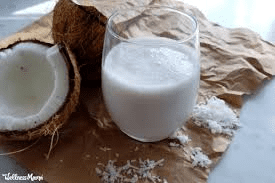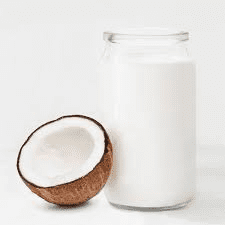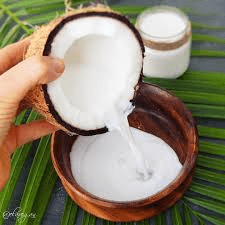Coconut milk is a popular ingredient in many cuisines around the world, especially in tropical regions where coconuts are abundant. It is a creamy, white liquid that is extracted from the grated flesh of mature coconuts. Unlike coconut water, which is the clear liquid found inside young green coconuts, coconut milk has a rich, nutty flavor and a thicker consistency.
The process of making coconut milk involves grating the flesh of mature coconuts and soaking it in hot water. The mixture is then strained through a cheesecloth or fine mesh sieve to remove any solid particles. The resulting liquid is what we know as coconut milk.
Coconut milk is a versatile ingredient that can be used in a variety of ways. It is commonly used in curries, soups, and stews as a flavoring agent and thickener. It can also be used as a dairy-free alternative to milk in many recipes, such as smoothies and baked goods.
In addition to its culinary uses, coconut milk also has several health benefits. It is a rich source of medium-chain triglycerides (MCTs), which are a type of healthy fat that can be easily converted into energy by the body. MCTs have also been shown to help boost metabolism and promote weight loss.
Coconut milk is also a good source of vitamins and minerals, including vitamin C, iron, and potassium. These nutrients can help support immune function, reduce inflammation, and maintain healthy blood pressure levels.
Coconut milk is a nutritious and flavorful ingredient that can be used in a variety of ways. Whether you are looking to add some tropical flair to your cooking or seeking a dairy-free alternative to milk, coconut milk is definitely worth considering.
The Economic Importance and Uses of Coconut Milk

1. Food Industry: Coconut milk is widely used in the food industry for cooking, baking, and beverage production. It serves as a versatile ingredient in various cuisines, adding flavor, richness, and creaminess to dishes.
2. Dairy Alternative: Coconut milk is a popular dairy alternative for individuals who are lactose intolerant, allergic to cow’s milk, or following a vegan diet. It can be used as a substitute for cow’s milk in recipes and beverages.
3. Culinary Applications: Coconut milk is used in a wide range of culinary applications, including curries, soups, stews, sauces, desserts, and smoothies. It adds a unique tropical flavor and creamy texture to dishes.
4. Traditional Medicine: In some traditional medicinal practices, coconut milk is used to prepare herbal remedies for various ailments such as digestive issues, skin conditions, and respiratory ailments. It is believed to have soothing and healing properties.
5. Beverage Industry: Coconut milk is utilized in the beverage industry for producing coconut-based beverages such as coconut water blends, smoothies, shakes, and cocktails. It adds richness and flavor to beverages and can be enjoyed on its own or mixed with other ingredients.
6. Cosmetic Products: Coconut milk is incorporated into cosmetic products such as soaps, shampoos, conditioners, lotions, and creams. It is valued for its moisturizing, nourishing, and soothing properties for skin and hair care.
7. Nutritional Supplements: Coconut milk is used as a base ingredient in nutritional supplements such as protein powders, meal replacements, and dietary supplements. It provides essential nutrients and energy for individuals seeking alternative sources of nutrition.
8. Ice Cream and Frozen Desserts: Coconut milk is a key ingredient in dairy-free ice cream and frozen desserts for individuals with dietary restrictions or preferences. It offers a creamy texture and tropical flavor to frozen treats.
9. Baked Goods: Coconut milk is used in baking to make cakes, cookies, muffins, bread, and other baked goods. It adds moisture, richness, and flavor to baked recipes, especially those with tropical or Asian-inspired flavors.
10. Global Cuisine: Coconut milk is a staple ingredient in the cuisines of many tropical regions, including Southeast Asia, the Caribbean, Africa, and South America. It is used in traditional dishes such as Thai curry, Jamaican rice and peas, Indian desserts, and Brazilian seafood stew.
11. Export Industry: Coconut milk production and export contribute to the economy of coconut-producing countries, generating revenue and employment opportunities for local communities. Coconut milk is exported to international markets for culinary, industrial, and cosmetic purposes.
12. Shelf-Stable Products: Coconut milk is available in various forms, including canned, carton, powdered, and frozen formats. Shelf-stable coconut milk products have a long shelf life and can be stored at room temperature, making them convenient for consumers and retailers.
13. Health Food Stores: Coconut milk is sold in health food stores, supermarkets, and specialty shops as a natural, plant-based alternative to dairy milk. It appeals to health-conscious consumers seeking dairy-free, gluten-free, and organic options.
14. Cooking Classes and Workshops: Coconut milk is featured in cooking classes, workshops, and culinary events where participants learn to prepare traditional and contemporary dishes using coconut milk. It is a popular ingredient in cooking demonstrations and recipe tastings.
15. Restaurant Menus: Coconut milk-based dishes are featured on restaurant menus worldwide, catering to diverse dietary preferences and cultural tastes. Restaurants offer a variety of coconut milk-infused dishes, from appetizers to main courses to desserts.
16. Home Cooking: Coconut milk is commonly used in home cooking by individuals and families seeking flavorful and nutritious meal options. It is readily available in supermarkets and can be incorporated into everyday recipes or special occasions.
17. Street Food Vendors: Coconut milk is used by street food vendors and food stalls to prepare quick and affordable dishes such as coconut curry, coconut rice, coconut-based beverages, and desserts. It adds richness and depth of flavor to street food offerings.
Read Also: How to Farm and Care for Japanese Jack Mackerel Fish (Trachurus japonicus)
The Products and By-products That Can Be Derived From Coconut Milk

1. Coconut Cream: Coconut cream is a thick, rich product made from simmering coconut milk to reduce its water content. It is used as a topping for desserts, a base for sauces, and an ingredient in cocktails and beverages.
2. Coconut Yogurt: Coconut milk can be fermented with probiotic cultures to make dairy-free coconut yogurt. Coconut yogurt is enjoyed as a creamy, tangy alternative to traditional dairy yogurt and is available in various flavors and formulations.
3. Coconut Ice Cream: Coconut milk is used as a base ingredient in dairy-free ice cream and frozen desserts. Coconut ice cream offers a creamy texture and tropical flavor, often enhanced with add-ins such as chocolate, fruit, or nuts.
4. Coconut Curry Sauce: Coconut milk is a key ingredient in coconut curry sauce, a flavorful and aromatic sauce used in Thai, Indian, and Caribbean cuisines. Coconut curry sauce is typically made with coconut milk, curry spices, aromatics, and protein or vegetables.
5. Coconut Condensed Milk: Coconut condensed milk is a sweetened, thickened product made from coconut milk and sugar. It is used as a sweetener and flavoring agent in desserts, beverages, and baked goods, similar to traditional condensed milk.
6. Coconut Flavored Beverages: Coconut milk is used to flavor a variety of beverages such as coconut water blends, smoothies, shakes, and cocktails. Coconut-flavored beverages offer a refreshing and tropical taste experience for consumers.
7. Coconut Pudding: Coconut milk is used to make creamy coconut pudding, a popular dessert in many tropical cuisines. Coconut pudding is often flavored with vanilla, cinnamon, or tropical fruits and served chilled as a refreshing treat.
8. Coconut Custard: Coconut milk is used to make coconut custard, a creamy and indulgent dessert enjoyed in many cultures. Coconut custard is baked or steamed until set and can be served plain or topped with fruit, nuts, or caramel sauce.
9. Coconut Milk Soap: Coconut milk is incorporated into handmade soap recipes for its moisturizing, nourishing, and skin-loving properties. Coconut milk soap is often scented with essential oils and botanicals for a luxurious bathing experience.
10. Coconut Milk Lotion: Coconut milk is used in natural skincare products such as body lotions, creams, and moisturizers. Coconut milk lotion provides hydration, softness, and a light tropical fragrance for smooth and healthy-looking skin.
11. Coconut Milk Shampoo: Coconut milk is used in shampoo formulations for its cleansing, conditioning, and nourishing properties for hair and scalp health. Coconut milk shampoo is suitable for all hair types and helps restore moisture balance.
12. Coconut Milk Conditioner: Coconut milk is used in conditioner formulations to detangle, soften, and smooth hair for easy styling and manageability. Coconut milk conditioner provides hydration and shine for healthy-looking hair.
13. Coconut Milk Hair Mask: Coconut milk can be used as a natural hair mask to nourish, repair, and strengthen hair strands. Coconut milk hair masks are applied to damp hair, left on for a period of time, and rinsed out for silky-smooth results.
14. Coconut Milk Bath Soak: Coconut milk is added to bathwater for a luxurious and soothing bathing experience. Coconut milk bath soaks hydrate and soften the skin, leaving it feeling silky-smooth and refreshed.
15. Coconut Milk Body Scrub: Coconut milk is combined with exfoliating ingredients such as sugar or salt to create a nourishing body scrub. Coconut milk body scrubs gently buff away dead skin cells, revealing softer, smoother skin underneath.
16. Coconut Milk Candle: Coconut milk is used as a fragrance component in scented candles for its sweet, tropical aroma. Coconut milk candles create a warm and inviting atmosphere, filling the air with the scent of coconut paradise.
17. Coconut Milk Lip Balm: Coconut milk is infused into lip balm formulations for its moisturizing and nourishing properties. Coconut milk lip balms hydrate and protect lips from dryness, leaving them soft, supple, and kissable.
Read Also: Worm Infestation on Ruminant Animals: Symptoms and Treatment
Frequently Asked Questions (FAQs) About Coconut Milk

1. What is coconut milk?
Coconut milk is a creamy liquid derived from the grated flesh of mature coconuts. It is commonly used in cooking, baking, and beverage production for its rich flavor and texture.
2. How is coconut milk made?
Coconut milk is made by blending or soaking grated coconut flesh in water and then straining the mixture to extract the milky liquid. The resulting coconut milk can be used fresh or processed further for various culinary and industrial applications.
3. What are the differences between coconut milk and coconut water?
Coconut milk is made from the grated flesh of mature coconuts and has a creamy consistency and rich flavor. Coconut water, on the other hand, is the clear liquid found inside young, green coconuts and is naturally sweet and refreshing.
4. Is coconut milk dairy-free?
Yes, coconut milk is dairy-free and suitable for individuals who are lactose intolerant, allergic to cow’s milk, or following a vegan diet. It is a plant-based alternative to dairy milk in cooking, baking, and beverages.
5. How is coconut milk used in cooking?
Coconut milk is used in cooking to add flavor, creaminess, and richness to dishes such as curries, soups, stews, sauces, desserts, and beverages. It is a versatile ingredient in both savory and sweet recipes.
6. Can coconut milk be substituted for dairy milk in recipes?
Yes, coconut milk can be substituted for dairy milk in recipes such as curries, soups, smoothies, and baked goods. It provides a tropical flavor and creamy texture to dishes and is suitable for individuals with dairy allergies or dietary restrictions.
7. Are there different types of coconut milk?
Yes, there are different types of coconut milk available, including full-fat coconut milk, light coconut milk, and coconut cream. Full-fat coconut milk has a higher fat content and richer flavor, while light coconut milk is lower in fat and calories.
8. How should coconut milk be stored?
Coconut milk should be stored in a cool, dry place away from direct sunlight. Once opened, canned coconut milk should be refrigerated and consumed within a few days or transferred to an airtight container for longer storage.
9. Can coconut milk be frozen?
Yes, coconut milk can be frozen for longer storage. It should be poured into ice cube trays or freezer-safe containers and stored in the freezer for up to several months. Thawed coconut milk may separate, so it should be stirred or blended before use.
10. Are there any health benefits of coconut milk?
Coconut milk is rich in vitamins, minerals, and healthy fats, making it a nutritious addition to the diet. It contains lauric acid, a type of fatty acid with antimicrobial and immune-boosting properties, as well as medium-chain triglycerides (MCTs) that may support heart health and weight management. However, coconut milk is also high in calories and saturated fat, so it should be consumed in moderation as part of a balanced diet.
Read Also: Top 20 Proven Benefits of Ginger Plant

